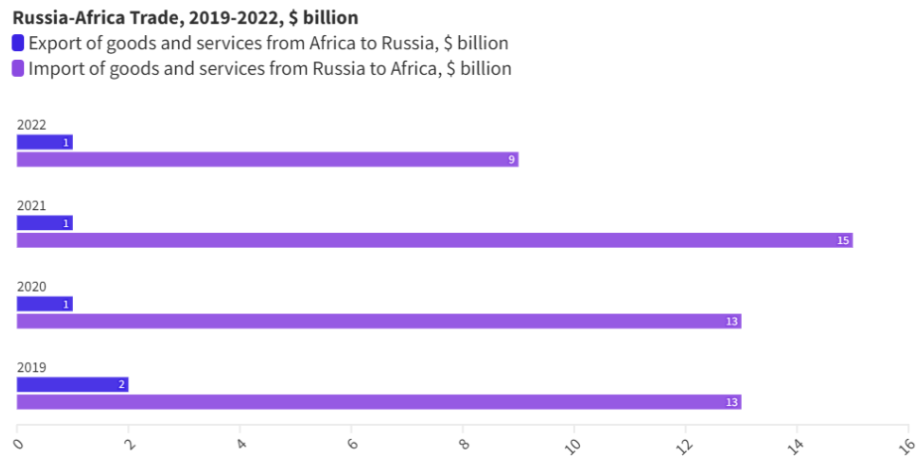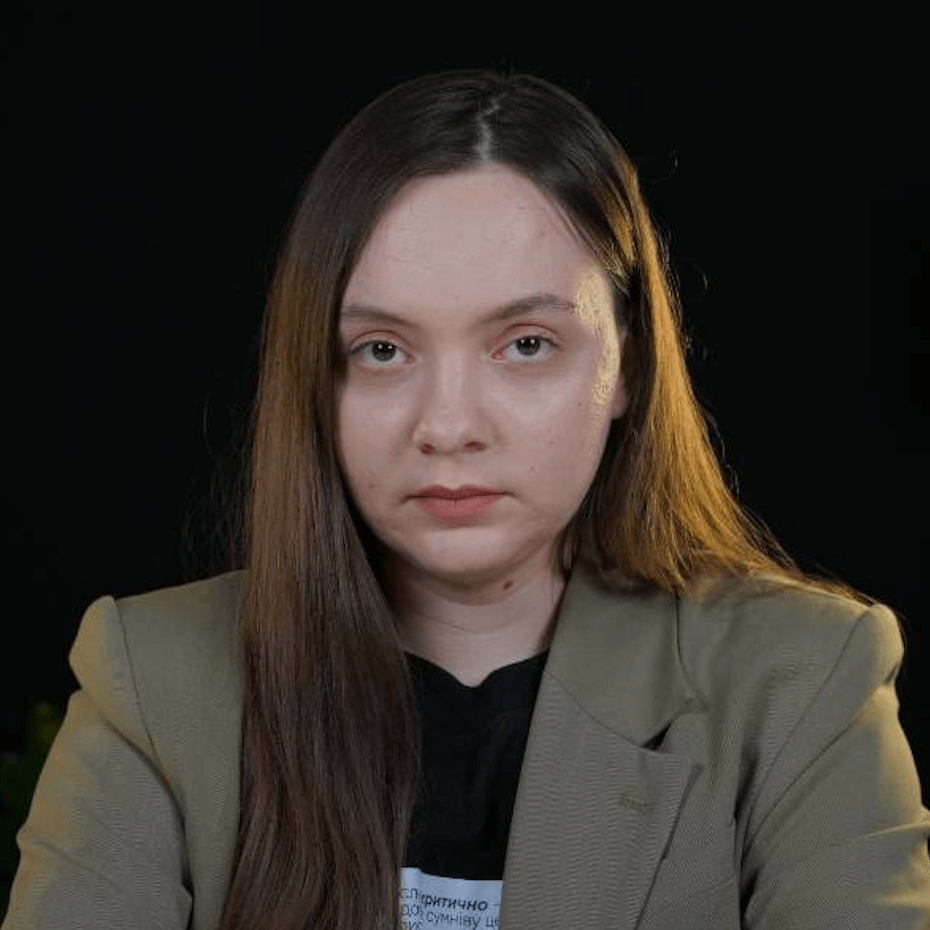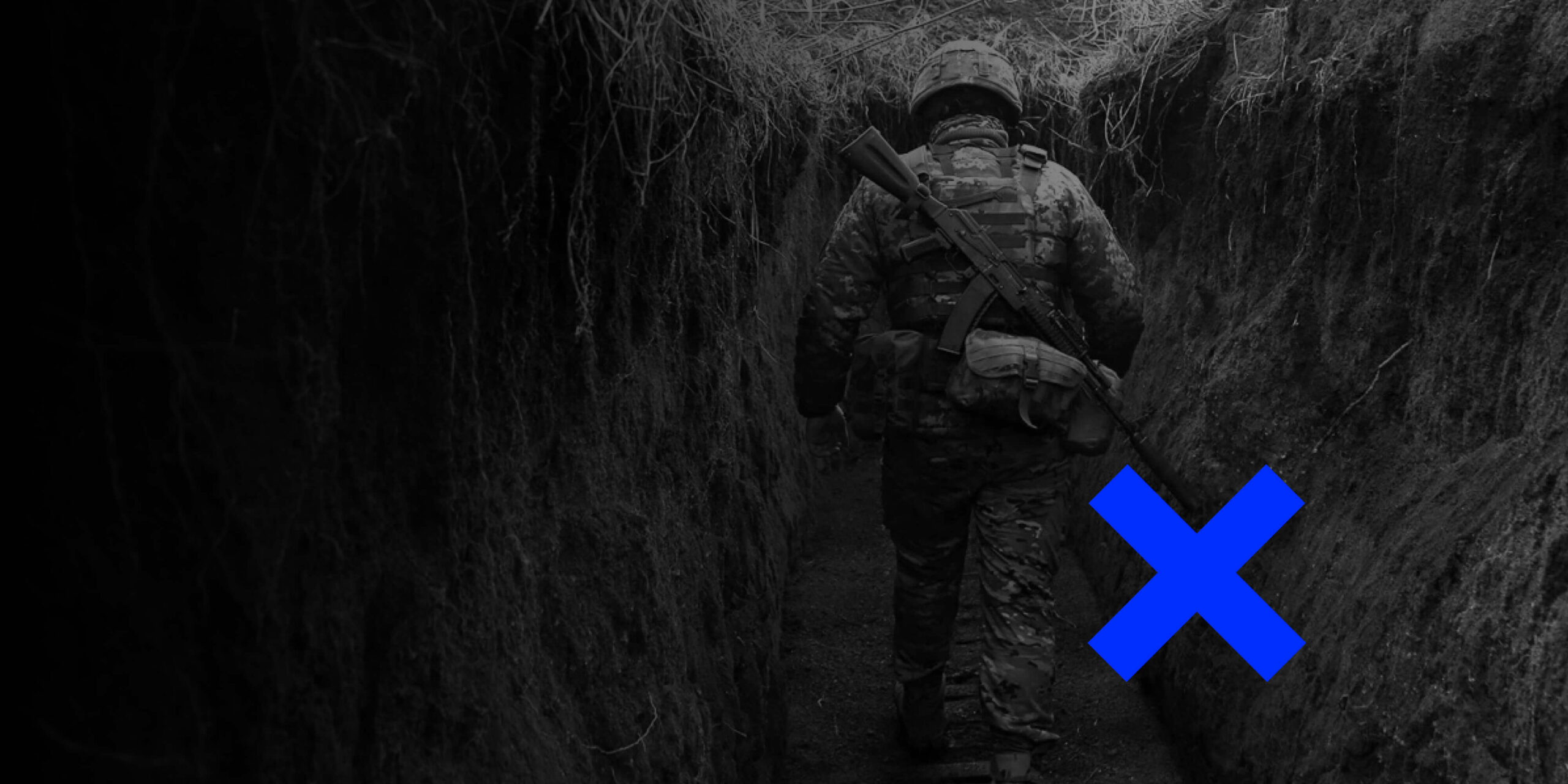On July 27-28 in St. Petersburg, the second “Russia-Africa” summit will take place (the first one was in 2019) along with the Economic and Humanitarian Forum “Russia-Africa.” So, Putin decided to remind everyone about the “close” and “strong” partnership between Russia and Africa and how Russia is “helping” the African continent. On July 24, his article titled “Russia and Africa: uniting efforts for peace, progress, and a successful future” was published. Let’s analyze another set of lies and manipulations from the world’s main liar.
Thesis: Russia did not attempt to colonize African countries; on the contrary, it helped them get rid of the “colonial oppression”
Putin claims that the relations between Russia and African countries have always been characterized by stability, trust, and friendliness and that the Russian government consistently supported African states in their struggle to break free from colonial oppression.
But this is manipulation. Indeed, Russia did not have colonies in African countries, but there is documented evidence of an attempt to establish them. In 1889, a Russian settlement led by explorer Nikolay Ashinov occupied the town of Sagallo in present-day Djibouti, naming it “New Moscow.” However, French forces, which had previously taken control of Djibouti, displaced the Russian settlement that same year and the Russian Empire authorities denied any connection with Ashinov.
For the Russian Empire, Africa was a difficult-to-reach continent. Therefore, it directed its ambitions towards closer regions, such as Eastern Europe, Central Asia, and the Caucasus, exploiting and subjugating peoples in a manner similar to how European countries did on the African and American continents. Currently, Russia positions itself as an anti-colonial state, even though it still occupies the territories of many nations and engages in an expansionist war against Ukraine. This hypocrisy has been going on for over 100 years. In 1842, following similar laws in Britain and France, Nicholas I issued a decree threatening punishment for Russian subjects who dared to participate in the slave trade and granted freedom to every black slave within his empire’s territory. However, it was only his successor after the lost Crimean War who freed the white serfs (peasants) of the Russian Empire. Herzen wrote (volume 12, page 41): “Moreover, isn’t the Russian government bound by a solemn treaty with England against the slave trade? Didn’t the Tsar himself declare free every black person who sets foot on his imperial soil? Why were Russian serfs unfortunate enough to be born white, just like their masters? The existence of Russian serfdom is not defined by law, and serfs are left at the mercy of the nobility without any regulation.”
The Soviet Union also showed little interest in Africa until the decolonization of the 1950s and 1960s. This opened up new opportunities for influence, and during the Cold War, the USSR supported communist movements in Angola, Algeria, and the territory of the modern Democratic Republic of the Congo, thus hindering their democratic development and contributing to instability on the continent. However, the Soviet Union was insufficiently informed about the history, political systems, and needs of the countries it supported, leading to a weakening of its influence. During the Cold War confrontations, the USSR often supported notorious leaders and dictators, including Bokassa and Gaddafi. In modern times, Russia is involved in extracting diamonds in Zimbabwe, gold in Sudan, and gas in Mozambique, providing various preferences and “assistance” to these countries in exchange. This assistance ranges from debt relief to the supply of weapons and military aid. These actions can also be considered a form of colonialism.
Thesis: Russia has invested and continues to invest in the development of African countries
Putin talks about Russia’s trade, economic, and scientific-technological cooperation with the African continent, boasting that “Russia’s trade with African countries in 2022 increased and reached nearly $18 billion.”
This is a lie and manipulation. In reality, Russia’s achievements (where they actually exist) are relatively insignificant. The Trade Map database of the International Trade Centre lacks information on Russia’s exports and imports for the year 2022. However, there is data from the African side regarding trade with Russia, and it shows a completely different trend: in 2022, Russia’s trade with African countries did not grow but declined. It was only around $10 billion, not $18 billion. In 2021, the trade volume was nearly $16 billion, which is still small compared to the trade volumes of African countries with other partners. It also does not align with the promises made during the first Russia-Africa summit in 2019 to reach a trade volume of $40 billion by 2023.
Source: Trade Map
$10 billion is less than 1% of the total trade volume of the continent. For comparison, Africa’s trade volumes with China amount to $127 billion (16%), with India — $87 billion (6%), with the USA — $69 billion (5%), and with France — $70 billion (5%).
Furthermore, there is no mention of mutual benefit in these trade relations. In 2022, Russia exported goods and services to Africa worth $9 billion and imported only $1 billion, leaving Africa with a trade deficit of $8 billion. As the Financial Times reports, Russia lacks the “economic muscle” to directly compete with China or the USA when it comes to trade and investment in Africa. Therefore, Russia adopts a “spoiler” strategy: it increases its influence through interference in internal politics.
For Russia, local instabilities and violent conflicts present an opportunity to sell weapons and mercenary services to African armed groups. For instance, the private military company Wagner Group provides military support to governments of impoverished countries in exchange for concessions to exploit natural resources, including oil, gold, diamonds, bauxite, lithium, and chrome. This allows Russia to extract wealth from the continent. Currently, Russia supports authoritarian regimes in the Central African Republic, Sudan, Mali, and Libya. Such exploitation of Africa’s natural resources does not contribute to its economic development in any way.
Thesis: Russia seeks to act within the framework of international law and recognizes the United Nations, providing it with a “central coordinating role”
Putin claims that Russia’s rapprochement with African countries is based on the desire to form a system of relations that prioritizes international law and recognizes the “central coordinating role of the United Nations.”
This is a lie. Since 2014, Russia has violated nearly 400 international agreements, including the UN Charter, the UN Convention on Combating Financing of Terrorism, the UN Convention on the Prevention and Punishment of the Crime of Genocide, the UN Convention on the Elimination of All Forms of Racial Discrimination, and others. Russia disregards the principles of the United Nations and does not abide by, nor seeks to abide by, the norms of international law.
Since 2004, Russia has been systematically committing war crimes in several countries, including Georgia, Ukraine, Syria, and Chechen Republic. These crimes include killings, torture, terrorism, deportation or forced displacement, abductions, rape, looting, unlawful imprisonment, illegal airstrikes, and attacks on civilian objects. As a result, Western countries imposed significant sanctions on Russian officials twice (in 2014 and 2022), and in April 2022, the United Nations General Assembly officially suspended Russia’s membership in the UN Human Rights Council.
Moreover, in March 2023, judges of the International Criminal Court issued an arrest warrant for Putin. He is wanted for prosecution for a war crime committed in Ukraine — the deportation and transfer of children from the occupied territories of Ukraine to Russia. The arrest warrant is applicable in all countries that have signed the Rome Statute, including African states. In response, Russia has already threatened South Africa with war if Putin is arrested during his visit to the country. Ultimately, the blackmail attempt failed, and instead of Putin, the Russian Foreign Minister Lavrov will attend the BRICS summit in South Africa, as Putin still risks arrest there.
Thesis: it is in the interests of African states to find ways to circumvent the sanctions imposed on Russia
The appeal to African leaders serves a rather practical purpose: to persuade Africa to support or at least adopt a neutral stance towards Russian aggression and to assist Russia in circumventing the sanctions. Putin does not mention the invasion of Ukraine in the article directly but alludes to it with vague phrases about “changes happening in the world” and “unfavorable external influences,” due to which Russia seeks new logistics chains and payment mechanisms.
The narrative of Russia being deceived and “led astray” by Western countries or international organizations existed in Russian rhetoric even before the full-scale invasion. In this story, Russia portrays itself as the victim, while everyone else is portrayed as fraudsters or provocateurs. This time, Putin complains about sanctions that “seriously complicate the export of Russian food.” However, he conveniently omits that the imposed sanctions target specific banks, companies, and individuals, but do not restrict the volumes of Russian exports of grains and fertilizers. The EU and the USA have repeatedly stated that food and agricultural products remain exempt from the sanctions and have held Russia responsible for exacerbating the food crisis.
Putin also mentions 262,000 tons of Russian agricultural products, most of which were supposedly blocked in European ports. Presumably, this refers to fertilizers that the Russian group “Uralchem-Uralkali” agreed to transfer to Africa free of charge in November 2022. However, Western countries did not impose sanctions on the transfer of these cargoes. The latest news about the delivery of the second batch of fertilizers appeared at the end of May. Neither the Russian company nor the UN, which chartered the ships, reported any blockade of humanitarian cargo. It is possible that Russia intentionally delays the shipments to maintain pressure on Africa. Similar blackmail tactics were used by Russia in 2022 when they reduced gas supplies to Germany by over 40%, allegedly due to Canada’s refusal to return a turbine, which Russia claimed was caused by Canada’s sanctions related to the war in Ukraine (this was also a lie by Russia — EU sanctions did not hinder the delivery of the turbine needed to increase the capacity of the “Nord Stream” pipeline).
A separate part of the article by the Russian dictator is dedicated to the so-called Black Sea Grain Initiative. It was concluded on July 22, 2022, through the mediation of Turkey and the UN and was extended several times. On July 17, 2023, Russia withdrew from the initiative and became more active in destroying the infrastructure of Ukrainian ports and agricultural enterprises.
Thesis: the EU and the US use the “grain agreement” purely for their own enrichment, while grain is not exported to low-income countries
In his article, Putin claimed that the grain initiative was allegedly used to enrich large American and European businesses. This is not true. According to the United Nations’ data as of July 25, 57% of the grain within the initiative was exported to developing countries, and China is the leading importer of Ukrainian grain.
Vladimir Putin uses World Bank statistics to support his claims, which indeed shows that a significant portion of Ukrainian grain is exported to countries with above-average and high incomes. However, these exports are conducted through commercial contracts negotiated by the Ukrainian side, with which Russia has no involvement. In other words, Ukraine sells its grain to the countries willing to buy it.
Furthermore, due to the impact of the grain agreement, global food prices began to decrease after a significant increase caused by Russia’s aggression against Ukraine. Representatives of the Food and Agriculture Organization of the United Nations (FAO) have repeatedly stated that the grain agreement has been one of the factors contributing to the decrease in global prices. Lower prices mean that poorer countries (and their citizens) can afford to purchase more food.
Moreover, food doesn’t necessarily have to be consumed in the importing country. As indicated by the UN, agricultural produce can be processed in the importing country and then exported to other regions. Therefore, it is possible that a portion of the grains exported to developed countries eventually also finds its way to developing nations.
Vladimir Putin also claims that the Russian condition for the grain agreement was not fulfilled, particularly the lifting of sanctions on Russian grain exports. This is false, as this condition was not part of the agreement, and the West did not impose sanctions on Russia’s agricultural sector. The UN and Russia entered into a memorandum in which the UN agreed to facilitate the promotion of Russian food and fertilizers on global markets; however, this memorandum does not cover sanctions. Moreover, the document is not an international treaty and therefore does not establish any rights or obligations under international law.
Thesis: Russia exited the “grain agreement” because the agreement “failed to fulfill its humanitarian purpose”
Russia justified its withdrawal from the grain agreement by claiming that it “failed to fulfill its humanitarian purpose.” In reality, statistics emphasize the humanitarian mission of the agreement: over the course of almost a year, the initiative successfully exported over 32 million tons of Ukrainian food, including 725 thousand tons of food delivered to Ethiopia, Yemen, Afghanistan, and other countries that are most affected by food crises. This helped reduce global prices — in June 2023, the FAO Food Price Index fell by 23.4% compared to the peak prices in March 2022 and by 11.6% compared to July 2022.
Russia is attempting to disrupt the grain agreement not for the first time. As reported by the Main Intelligence Directorate of the Ministry of Defense of Ukraine, Russia gradually implemented various measures to slow down and ultimately block Ukrainian agricultural exports. For instance, Russian representatives in the Joint Coordination Center (the body monitoring the operation of the grain corridor) limited the number of vessels in the corridor, hindered vessel access to ports, suspended registration of grain carriers, and so on. As a result of these sabotages, the occupiers prevented Ukraine from exporting around 20 million tons of goods.
Thus, for Putin, the preparations for the Russia-Africa Summit began with another spread of falsehoods and propaganda, which is quite evident to those who make little effort to believe it. Hopefully, the leaders of African countries have already recognized the true value of Russia’s words and its leadership.
Authors: Yelyzaveta Chekhovska, Stanislav Korolkov, Alina Tropynina, Kyrylo Perevoshchykov
Attention
The authors do not work for, consult to, own shares in or receive funding from any company or organization that would benefit from this article, and have no relevant affiliations






